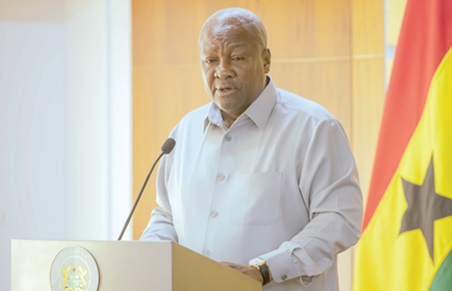President John Mahama has defended the government’s decision to impose an additional GH¢1 Energy Sector Recovery Levy (ESLA), stating that the move, though difficult, is critical to resolving the country’s crippling energy sector debts and preventing a return to erratic power supply.
Speaking at the Jubilee House during the presentation of the final report of the National Economic Dialogue, the President gave the assurance that the recent appreciation of the Ghana cedi had cushioned the impact, meaning consumers would not face immediate fuel price increases.
The energy sector, burdened with over $3.1 billion in debt, faces an additional $1.8 billion requirement to finance fuel for thermal power generation in the coming months.
President Mahama warned that failure to act would risk another cycle of “dumsor” (power outages), which could cripple businesses and stifle economic recovery.
Parliament, under a certificate of urgency, approved an amendment to the Energy Sector Levies Act (ESLA), introducing the GH¢1 increment expected to generate GH¢5.7 billion annually.
The President also assured that revenues from the levy would be strictly ring-fenced, meaning it would not go into the Consolidated Fund to pay energy sector debts and fund fuel purchases.
President Mahama added that the government would also work to reduce inefficiencies in energy procurement and distribution, while expanding social interventions for vulnerable groups.
Future outlook
Looking beyond the immediate crisis, President Mahama outlined a brighter energy future for the country.

He expressed confidence that the country’s energy mix would gradually shift away from expensive liquid fuels as domestic gas production would increase from the ENI Sankofa field, Jubilee and TEN fields.
Additional gas supplies expected through the West African Gas Pipeline would further reduce reliance on costly fuel imports, he added.
Economic Reform
The National Economic Dialogue report presented to the President contained a comprehensive blueprint for economic recovery, with several key reform areas.
On fiscal discipline, the government has committed to implementing a binding debt ceiling designed to reduce Ghana’s debt-to-GDP ratio to 45 per cent by 2028.
To strengthen oversight, an Independent Fiscal Council will be established by the third quarter of 2025 to provide professional, non-partisan monitoring of national budgeting and borrowing practices.
A major economic stimulus will come through the government’s flagship 24-Hour Economy programme, which will provide incentives for extended operations in key sectors, including agri-processing, manufacturing and logistics.
The Ghana Export Promotion Authority (GEPA) has been tasked to implement an ambitious new strategy targeting $10 billion in non-traditional exports by 2028.
Recognising the need for institutional reform, the government will launch a Public Sector Productivity Strategy in January 2026 to eliminate duplication, digitise operations and improve service delivery standards.
President Mahama said education and training systems would be realigned to better meet labour market demands, with particular focus on preparing the youth for emerging job opportunities.
The ceremony was attended by cabinet ministers and senior government officials, including the Minister of Finance, Dr Cassiel Ato Forson, and the Chief of Staff, Julius Debrah.
Also present were members of the planning committee of the National Economic Dialogue, including its chairman, Dr Ishmael Yamson.
